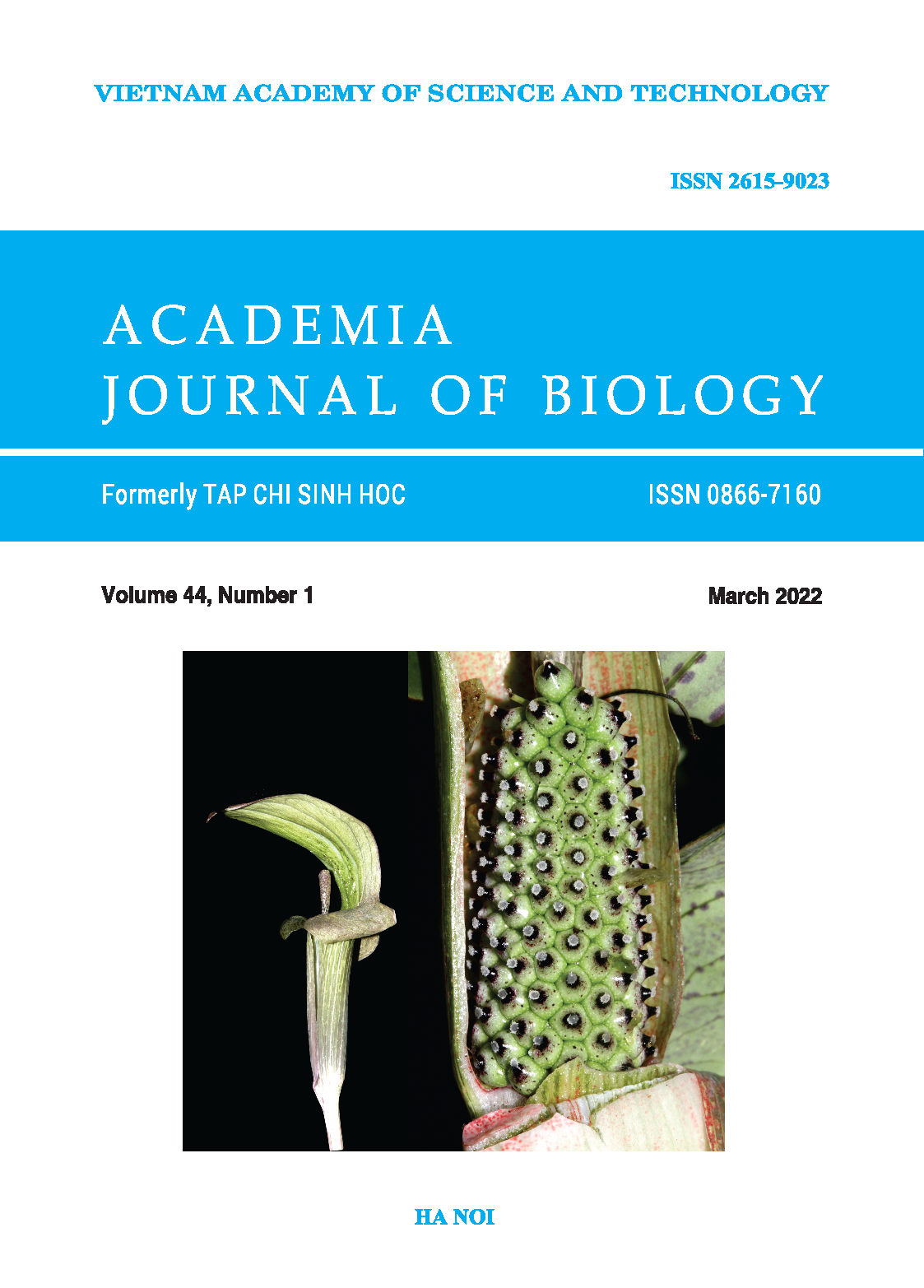Whole-exome sequencing as a diagnostic tool for ipex syndrome
Authors
DOI: https://doi.org/10.15625/2615-9023/16305Keywords:
FOXP3, IPEX syndrome, primary immunodeficiency, Vietnamese, WES.References
An Y. F., Xu F., Wang M., Zhang Z. Y., Zhao X. D., 2011. Clinical and molecular characteristics of immunodysregulation, polyendocrinopathy, enteropathy, X-linked syndrome in China. Scand J Immunol, 74(3): 304–309. https://doi.org/10.1111/j.1365-3083.2011.02574.x.
Barzaghi F., Amaya Hernandez L. C., Neven B., Primary Immune Deficiency Treatment C., the Inborn Errors Working Party of the European Society for B., Marrow T., 2018a. Long-term follow-up of IPEX syndrome patients after different therapeutic strategies: An international multicenter retrospective study. J Allergy Clin Immunol, 141(3): 1036–1049. https://doi.org/10.1016/j.jaci.2017.10.041
Barzaghi F., Amaya Hernandez L. C., Neven B., Ricci S., Kucuk Z. Y., Bleesing J. J., Nademi Z., Slatter M. A., Ulloa E. R., Shcherbina A., Roppelt A., Worth A., Silva J., Aiuti A., Murguia-Favela L., Speckmann C., Carneiro-Sampaio M., Fernandes J. F., Baris S., Ozen A., Karakoc-Aydiner E., Kiykim A., Schulz A., Steinmann S., Notarangelo L. D., Gambineri E., Lionetti P., Shearer W. T., Forbes L. R., Martinez C., Moshous D., Blanche S., Fisher A., Ruemmele F. M., Tissandier C., Ouachee-Chardin M., Rieux-Laucat F., Cavazzana M., Qasim W., Lucarelli B., Albert M. H., Kobayashi I., Alonso L., Diaz De Heredia C., Kanegane H., Lawitschka A., Seo J. J., Gonzalez-Vicent M., Diaz M. A., Goyal R. K., Sauer M. G., Yesilipek A., Kim M., Yilmaz-Demirdag Y., Bhatia M., Khlevner J., Richmond Padilla E. J., Martino S., Montin D., Neth O., Molinos-Quintana A., Valverde-Fernandez J., Broides A., Pinsk V., Ballauf A., Haerynck F., Bordon V., Dhooge C., Garcia-Lloret M. L., Bredius R. G., Kalwak K., Haddad E., Seidel M. G., Duckers G., Pai S. Y., Dvorak C. C., Ehl S., Locatelli F., Goldman F., Gennery A. R., Cowan M. J., Roncarolo M. G., Bacchetta R., Primary Immune Deficiency Treatment C., the Inborn Errors Working Party of the European Society for B., Marrow T., 2018b. Long-term follow-up of IPEX syndrome patients after different therapeutic strategies: An international multicenter retrospective study. J. Allergy Clin. Immunol., 141(3): 1036–1049 e1035. https://doi.org/10.1016/j.jaci.2017. 10.041
Bennett C. L., Christie J., Ramsdell F., Brunkow M. E., Ferguson P. J., Whitesell L., Kelly T. E., Saulsbury F. T., Chance F., Ochs H. D., 2001. The immune dysregulation, polyendocrinopathy, enteropathy, X-linked syndrome (IPEX) is caused by mutations of FOXP3. Nature Genetics, 27(1): 20–21. https://doi.org/10.1038/83713
Chatila T. A., Blaeser F., Ho N., Lederman H. M., Voulgaropoulos C., Helms C., Bowcock A. M., 2000. JM2, encoding a fork head-related protein, is mutated in X-linked autoimmunity-allergic disregulation syndrome. J. Clin. Invest., 106(12): 75–81. https://doi.org/10.1172/ JCI11679
Chou J., Ohsumi T. K., Geha R. S., 2012. Use of whole exome and genome sequencing in the identification of genetic causes of primary immunodeficiencies. Curr Opin Allergy Clin Immunol, 12(6): 623–628. https://doi.org/10.1097/ACI.0b013e3283588ca6
Gambineri E., Ciullini Mannurita S., Hagin D., Vignoli M., Anover-Sombke S., DeBoer S., Segundo G. R. S., Allenspach E. J., Favre C., Ochs H. D., Torgerson T. R., 2018. Clinical, Immunological, and Molecular Heterogeneity of 173 Patients With the Phenotype of Immune Dysregulation, Polyendocrinopathy, Enteropathy, X-Linked (IPEX) Syndrome. Front Immunol, 9: 2411. https://doi.org/10.3389/fimmu.2018.02411
Ge T., Wang Y., Che Y., Xiao Y., Zhang T., 2017. Atypical Late-Onset Immune Dysregulation, Polyendocrinopathy, Enteropathy, X-Linked Syndrome with Intractable Diarrhea: A Case Report. Front Pediatr, 5: 267. https://doi.org/10.3389/fped.2017.00267
Gischel M. E., Beck C., & Hall M., 2009. A Mystery Diagnosis: Immune Dysregulation, Polyendocrinopathy, Enteropathy, X-Linked Recessive. Laboratory Medicine, 40(5): 303–306.. A Mystery Diagnosis: Immune Dysregulation, Polyendocrinopathy, Enteropathy, X-Linked Recessive. Laboratory Medicine, 40(5): 303–306. https://doi.org/ 10.1309/lmcxcu6gze7g8zei
Jamee M., Zaki-Dizaji M., Lo B., Abolhassani H., Aghamahdi F., Mosavian M., Nademi Z., Mohammadi H., Jadidi-Niaragh F., Rojas M., Anaya J. M., Azizi G., 2020. Clinical, Immunological, and Genetic Features in Patients with Immune Dysregulation, Polyendocrinopathy, Enteropathy, X-linked (IPEX) and IPEX-like Syndrome. J. Allergy Clin. Immunol Pract., 8(8): 2747–2760. https://doi.org/10.1016/j.jaip.2020.04.070
Kaur G., Goodall J. C., Jarvis L. B., Hill Gaston J. S., 2010. Characterisation of Foxp3 splice variants in human CD4+ and CD8+ T cells--identification of Foxp3Delta7 in human regulatory T cells. Mol Immunol, 48(1–3): 321–332. https://doi.org/10.1016/j.molimm. 2010.07.008
Li Z., Li D., Tsun A., Li B., 2015. FOXP3+ regulatory T cells and their functional regulation. Cell Mol. Immunol., 12(5): 558–565. https://doi.org/10.1038/cmi. 2015.10
Maffucci P., Filion C. A., Boisson B., Itan Y., Shang L., Casanova J. L., Cunningham-Rundles C., 2016. Genetic Diagnosis Using Whole Exome Sequencing in Common Variable Immunodeficiency. Front Immunol., 7: 220. https://doi.org/10.3389/fimmu.2016.00220
Mailer R. K., Falk K., Rotzschke O., 2009. Absence of leucine zipper in the natural FOXP3Delta2Delta7 isoform does not affect dimerization but abrogates suppressive capacity. PLoS One, 4(7): e6104. https://doi.org/10.1371/journal. pone.0006104
Martin-Santiago A., Hervas J. A., Hervas D., Rosell A., Caimari M., de Carlos J. C., Matamoros N., 2013. Diagnostic value of the skin lesions in immune dysregulation, polyendocrinopathy, enteropathy, X-linked syndrome. Pediatr. Dermatol., 30(6): e221–e222. https://doi.org/ 10.1111/pde.12126
Passerini L., Santoni de Sio F. R., Roncarolo M. G., Bacchetta R., 2014. Forkhead box
P3: the peacekeeper of the immune system. Int. Rev. Immunol., 33(2): 129–145. https://doi.org/10.3109/08830185. 2013.863303
Patey-Mariaud de Serre N., Canioni D., Ganousse S., Rieux-Laucat F., Goulet O., Ruemmele F., Brousse N., 2009. Digestive histopathological presentation of IPEX syndrome. Mod Pathol, 22(1): 95-102. https://doi.org/10.1038/ modpathol.2008.161
Powell B. R., Buist N. R. M., Stenzel P., 1982. An X-linked syndrome of diarrhea, polyendocrinopat.pdf. The journal of Pediatrics, 100(5): 731–737. https://doi.org/10.1016/s0022-3476(82)80 573-8
Seidel M.G., Boztug K., Haas O.A., 2016. Immune Dysregulation Syndromes (IPEX, CD27 Deficiency, and Others): Always Doomed from the Start? J Clin Immunol, 36(1): 6-7. https://doi.org/10.1007/ s10875-015-0218-5.
Stoddard J.L., Niemela J.E., Fleisher T.A., Rosenzweig S.D., 2014. Targeted NGS: A Cost-Effective Approach to Molecular Diagnosis of PIDs. Front Immunol, 5: 531. https://doi.org/10.3389/fimmu. 2014.00531.
Sun J., Yang L., Lu Y., Wang H., Peng X., Dong X., Cheng G., Cao Y., Wu B., Wang X., Zhou W., 2020. Screening for primary immunodeficiency diseases by next-generation sequencing in early life. Clin. Transl. Immunology, 9(5): e1138. https://doi.org/10.1002/cti2.1138
Ziegler S. F., 2006. FOXP3: of mice and men. Annu Rev Immunol, 24(1): 209–226. https://doi.org/10.1146/annurev.immunol.24.021605.090547
Downloads
Metrics
Downloads
PDF Downloaded: 76





